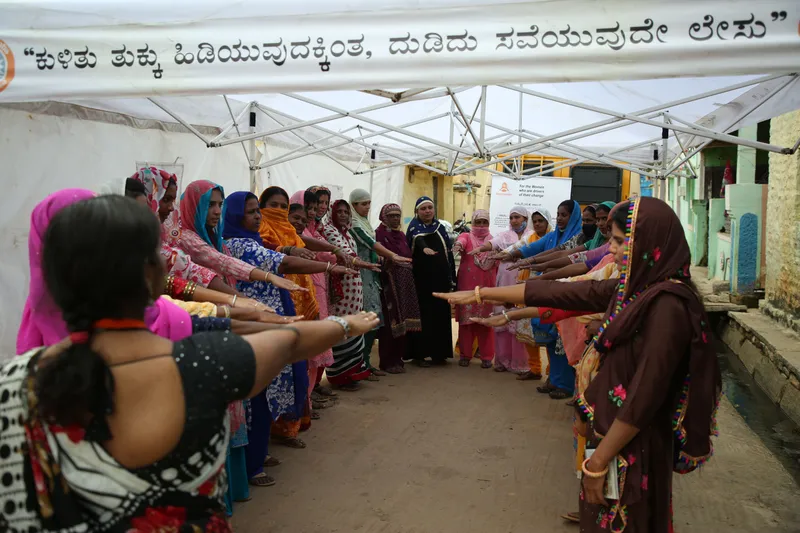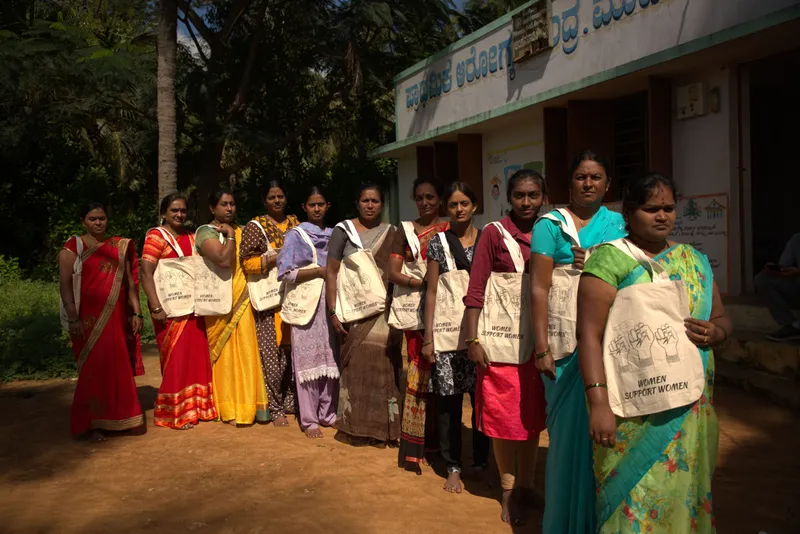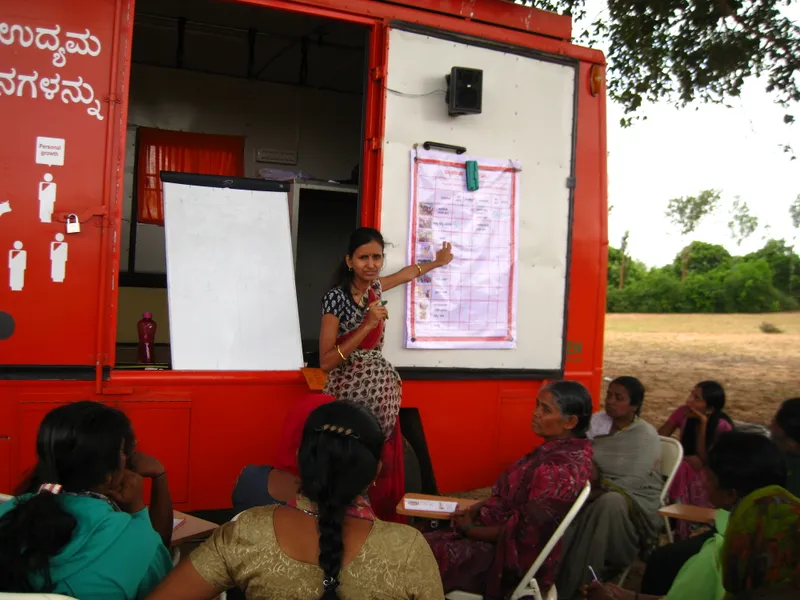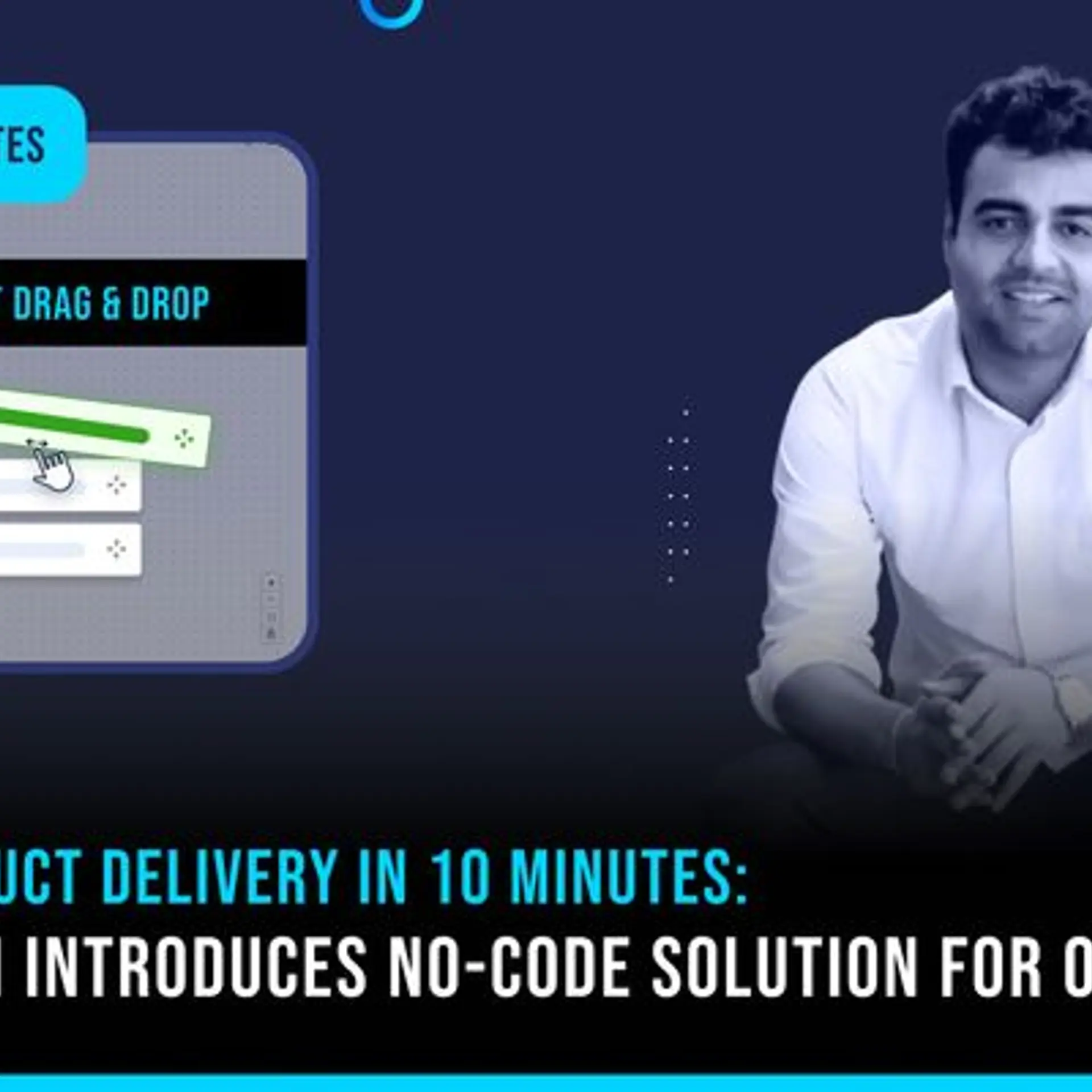Buzz Women is taking financial literacy, climate awareness, and community building to the doorstep of rural women
Uthara Narayanan and Dave Jongeneelen run Buzz Women, a mobile academy that provides doorstep training in finance, climate change, entrepreneurship, and leadership to rural women.
Kantalakshmi, who hails from Kadaripura village in Kolar district of Karnataka, suffered a miscarriage because of an acute liver infection caused by unhealthy and unsafe consumption of meat.
This left her shattered. That's when she realised that she was not alone in her fight to access healthy and good quality food.
Through the Buzz Green programme run by Buzz Women, an NGO, Kantalakshmi learnt about the benefits of desi poultry and organic farming through which one could produce high-quality eggs, meat and other crops that are nutritious and free from harmful chemicals.
Desi poultry refers to indigenous breeds of chicken that are traditionally raised in the rural areas of India. They are well-adapted to local environmental conditions and require minimal care and low-cost feeding practices. They are known for their hardiness, resistance to common poultry diseases, and ability to thrive on a free range. Meat and eggs from desi poultry are often considered more flavourful, nutritious and healthier than commercial hybrid breeds.
Kantalakshmi felt it was time to put her learning to action.
In May last year, she borrowed Rs 50,000 and started a farm with thirty chickens, four goats, two cows, and a buffalo. Simultaneously, she also started a kitchen garden with lady’s finger, potato, onion, beans, and drumstick.
By growing her own vegetables, Kantalakshmi is able to save a lot of money. She also earns an income by selling poultry products. Additionally, she is doing her bit for the environment and society by adopting organic farming practices and making nutritious and safe food more accessible to people.
In her effort to be an active climate change agent, Kantalakshmi has begun planting various trees, including mango, bel patra, and jamun, around her house. She has also taken up water recycling practices in her household and is sharing water-saving tips with her fellow villagers.
Kantalakshmi is one of the six lakh women who have been engaged with Buzz Women. Started in 2012 by Uthara Narayanan and Dave Jongeneelen, with the help of Suresh Krishna, the founder of a micro-credit bank in India, Buzz Women is a mobile academy providing doorstep training in finance, climate change, entrepreneurship, and leadership to rural women from low-income households.
“Low self worth and gender bias often lead to poverty of cash, confidence and collectivism. We enable women in building their confidence, generate more cash, deal with climate change, and influence their communities to move in the same direction,” Narayanan tells HerStory.
“We don’t empower women, they empower themselves. We set the process in motion, they take the lead,” she adds.
A childhood pursuit

Uthara Narayanan
Even as a child, Narayanan had been exposed to the importance of financial planning and budgeting. She recalls her father presenting the household budget to her just like the finance minister presents the national budget on TV. He would then ask her to put forth any demands or requests she had.
She also remembers her mother being always ready to help the people of the neighbourhood, while her father was part of the bankers’ union. So, when she joined Janaagraha, an NGO, after completing her graduation in cost management, it did not come as a surprise to anyone.
Although she was brought up in an equitable household, the society around her wasn’t so.
Her parents were often told that they would have to bear all the expenses as they had a girl child. Narayanan had also heard stories of how her grandmother had to care for her younger sibling when her grandfather passed away. She also remembers that her uncle received more opportunities than her mother.
“All these situations made me realise that I wanted to support more and more women. My fight started with that epiphany,” she says.
In 2011, she started visiting a nearby village in Karnataka to get an understanding of the problems of women living in low-income households. She realised that women were finding it hard to manage their finances, weighed down by the burden of loans from money lenders.
Life came full circle for Narayanan when she thought of using her budgeting skills to launch a door-to-door financial literacy programme for rural women. This thought eventually led to the genesis of Buzz Women in 2012.
Building for women
The Buzz intervention starts with self-shakti training; mobile buses reach remote villages in Karnataka to conduct a couple of training sessions for two-and-half-days each. There is a week’s gap between the sessions. These sessions are focused on the basics of financial literacy, including budgeting, loans, and interest. They also touch upon climate change and building confidence.
Buzz Women takes the help of anganwadi workers, who mobilise around 30 women from their village for the training programme.
Initially, Narayanan personally stayed in touch with the first 300 women who underwent training. However, as their numbers grew, it became challenging to be in touch with them. To address this, Buzz Women identifies and nominates one woman from each batch as an anchor woman or ‘gelathi’, which translates to ‘friend’.

Buzz Women is currently working with around 18,000 villages across 11 districts in Karnataka.
The gelathis are trained by Buzz staff in various aspects—self-awareness, communication, constructing an ideal village, and leadership. The anchor woman organises monthly learning sessions with her training group, which is called a ‘Beehive’.
The organisation follows a 5C model: managing family income or running a business (cash), understanding and addressing climate change (climate), focusing on mental health and hygiene (care), building a strong sisterhood to solve peer problems (community), and building trust in one’s own skills and qualities (confidence).
It also runs the Buzz Green programme, which is focused on climate change awareness, climate action close to home, and ecopreneurship.
“Particularly in rural areas, women and girls are often responsible for getting food and water for their families. But if the nearby well is dried up, they will have to walk to a farther one in the heat. Moreover, since most women eat last in the house, they might not get enough food in cases of food shortage. So climate change worsens existing conflicts and inequalities, disproportionately affecting women,” elaborates Narayanan.
Through the Buzz Green programme, the organisation spreads awareness about climate change, sustainability, management of natural resources, agricultural sustainability, and food security.
The organisation also runs a business programme, which provides mentorship to women entrepreneurs.
The community anchor/gelathi programme, business programme, and the climate action programme span five months.
“All these programmes have been launched on the go, realising the different needs and wants of women,” points out Narayanan.
She adds that all modules of the programmes are developed in collaboration with specialist organisations and experts, including behaviour specialists.

Uthara Narayanan plans to make the organisation self-sustainable in the near future.
Buzz Women works with around 18,000 villages across 11 districts in Karnataka and has 10,000 gelathis in India. It has 118 trained field associates, who visit the villages almost every quarter and meet the gelathis every month. Every field associate is attached to around 100 villages.
The organisation has also spread its wings to other countries as well. The organisation is also helping rural communities in Gambia, Georgia, Tanzania and Ukraine.
Buzz Women receives CSR funding from companies such as CitiBank and Aditya Birla Group.
Creating impact
Ammajan, who hails from Peresandra village in Karnataka, wanted to pursue engineering. However, her family got married in 2018. She could not complete her engineering degree. A year later, she became a mother.
Eventually, she came to know about the Buzz Women training in her village. The very first session motivated her so much that she decided to talk to her in-laws about continuing her education. She fought against her family and completed her degree.
However, this did not go down well with her family. After her divorce, Ammajan shifted to Bengaluru. She now works as a quality engineer in an aerospace company in the city.

Buzz Women receives CSR funding from companies such as CitiBank and Aditya Birla Group.
As a gelathi, Ammajaan does not compromise on her responsibilities towards her village. She says that all women come together to discuss their issues and spread awareness about child marriage, family planning, menstrual hygiene, and more.
“Today I am confident, but all this has happened because Buzz Women motivated me to stand up for myself and support other women for their better future,” she says.
Challenges and the way forward
Narayanan recalls the early days of her work when she couldn’t speak Kannada, making it challenging to connect with the local women.
Despite the language barrier, she relied on honesty and patience. Within six months, she learned Kannada and built a strong bond of trust with the women through consistent efforts.
She also faced difficulties in mobilising the women initially. It was only when she got help from the anganwadi workers that things began to improve.
Despite these challenges, Narayanan’s resolve has never wavered.
“I made a choice to do this, and I will stand for the sisterhood,” she says with conviction.
Narayanan wishes to see community anchors take ownership of all the programmes in their villages, so that the Buzz Women model can become self-sustainable in the near future. She also aims to expand the model to more geographies.
(The copy was updated with some corrections.)
Edited by Swetha Kannan







